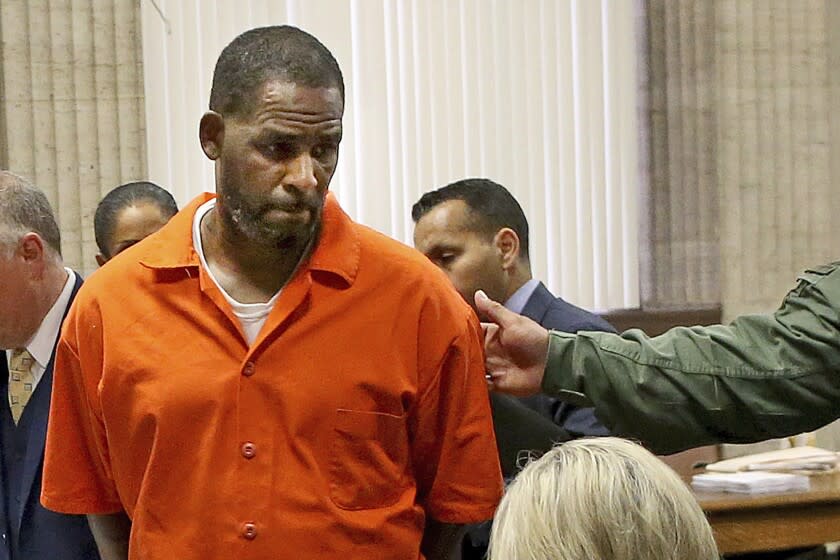Singer R. Kelly placed on suicide watch even though he's not suicidal, lawyer says

R. Kelly has been placed on suicide watch after being sentenced to 30 years in prison earlier this week. But his attorney says the disgraced R&B artist is not suicidal.
The "I Believe I Can Fly" singer is being held at the federal Metropolitan Detention Center in Brooklyn, N.Y., where he has been since his September conviction on federal sex-trafficking and racketeering charges for using his fame to lure young women and children for sex.
"Mr. Kelly was placed on suicide watch for purely punitive reasons in violation of his Eighth Amendment rights," his defense attorney, Jennifer Bonjean, said Friday in a statement to The Times, citing the amendment's prohibition of the federal government's ability to impose excessive bail, fines or cruel and unusual punishments.
Bonjean, who represented the Grammy Award winner during his six-week trial, said that the facility has a policy "of placing high profile individuals under the harsh conditions of suicide watch whether they are suicidal or not."
She noted that the detention center recently followed the same policy with socialite Ghislaine Maxwell, who was sentenced to 20 years in prison earlier this week for helping the financier Jeffrey Epstein sexually abuse underage girls.
"MDC Brooklyn is being run like a gulag," Bonjean said in her statement.
She said that she and her partner spoke with Kelly after he was sentenced Wednesday and that "he expressed that he was mentally fine and ONLY expressed concern that even though he was NOT suicidal, MDC would place him on suicide watch (as they did following the guilty verdict)."
"We are in the process of engaging in the court in this matter as his placement on suicide watch is illegal," she said.
Scott Taylor, a spokesperson for the Bureau of Prisons' offfice of public affairs, said Friday that the bureau, which runs MDC, "does not provide information about conditions of confinement or internal security practices for any particular inmate" for safety and security reasons.
"The BOP is committed to ensuring the safety and security of all inmates in our population, our staff, and the public. Humane treatment of the men and women in our custody is a top priority," Taylor said in an email to The Times.
Bonjean, who also recently represented Bill Cosby in a civil trial that he lost, told CNN on Friday that prosecutors and prison officials told her Kelly was placed under those conditions because he is well known. She said that she had asked the singer to email her after he was taken back into the facility following his sentencing on Wednesday, but never received a message from him.
"The irony of putting someone on suicide watch when they're not suicidal is it actually causes more harm," she told CNN. "It's punishment for being high-profile. And it's horrifying frankly. ... To put someone under suicide watch under those conditions is cruel and unusual when they don't need it."
The "Ignition" and "Bump 'N Grind" singer has been dogged by allegations of inappropriate conduct for years, but the outcry came to a fever pitch in the wake of the #MeToo movement and the Emmy-nominated documentary "Surviving R. Kelly," in which a number women shared their stories about the singer's alleged misconduct.
Kelly's defense team argued for him to be sentenced to 10 years or fewer for his crimes, while the prosecution pushed for 25 years or more. After receiving the 30-year sentence, he was also ordered to pay a $100,000 fine.
This story originally appeared in Los Angeles Times.

